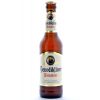Benediktiner Weissbräu - Benediktiner Weissbier
-
ABV:
5.4% -
Serving Temperature:
45-50° F -
Suggested Glassware:
Weizen Glass

Pouring a hazy, golden-amber hue, slightly deeper than some others of the style, this unfiltered wheat beer develops a voluminous head of foam, as we expect. Use a weizen glass or, if you don't have one, try another vertically-oriented glass like a pilsner glass or a stange so the head has room to rise. On the nose, look for yeast- and hop-driven notes, with spicy clove-like herbal tones and moderate noble hop aromas, along with touches of banana esters, bubblegum, and even a wisp of dried fruit. Flavorwise, the malty backbone is very wheaty and satisfying with a touch of caramel, while the overall body stays just on the light side of medium-bodied. We enjoyed how the beer achieves a nice balance among the fruity banana, bubblegum, and spicy clove notes. Bitterness is low, but the hops do contribute a nice kiss of herbal, grassy character and just a hint of lemon. We prefer our weizens without a lemon garnish (it's unnecessary and the acid kills the head), but if you're into that sort of thing then go ahead – we won't tell. Pair this brew with lighter cuisine such as chicken salads, white fish with lemon, or sautéed scallops. Weissbier is a great match for seafood and other salty or briney dishes. Prost!
So much great European beer flows from monasteries. In fact, if we had a nickel for every beer we've come across with a grinning monk on the label, we could just retire to our personal yachts and forget about running this whole beer club thing. These monastery beers are usually among the most traditional, old-school forms of their country's beers, and this is certainly the case with this month's featured brewery, Benediktiner Weissbräu (or Weißbräu, if you prefer).
The town of Ettal lies southwest of Munich at the extreme south of Bavaria, just a few miles from the Austrian border. The region is picturesque and idyllic, with green valleys separating green mountains and small villages dotted throughout. The "kloster" or abbey/monastery at Ettal was founded by Holy Roman Emperor Louis IV in 1330. Records show the monks had a brewery in nearby Oberammergau at least as far back as the 15th century, but in 1609 the monks built a much more convenient brewing facility on the grounds of the monastery itself. Brewing operations have been continuous there for over 400 years.
The Benedictine monks of Kloster Ettal live, work, and pray at the property, producing beer to finance their monastery and charitable works. The beer they are most famous for is traditional Bavarian weissbier, or "white beer," so called because of the cloudy contributions of the yeast to the unfiltered brew. Being a wheat beer, the style can also be called "weizenbier" ("wheat beer") or "hefeweizen" (literally "yeast-wheat" – a reference to the brew's key ingredients). Beer is still produced at the monastery brewery in Ettal, but the monks also have partnered with Licher Privatbräuerei (which dates to 1854) to produce their beer since demand is more than the monastery brewery can handle on its own. In both breweries, the beers are produced under the supervision of the monks and their "bräumeister," who oversee production and check the beer's quality by sampling straight out of the tanks. The beer is still produced using their original, historic recipes, along with the monastery's own unique weissbier cellar yeast strain which they call "Ettaler kellerhefe," which is responsible for the classic Bavarian weissbier aroma and flavor.
Currently, Benediktiner produces four styles: Weissbier Naturtrüb (this month's selection), Weissbier Dunkel, Alkoholfrei, and Hell (a Bavarian "Helles" or "light" Lager). We're pleased to bring you this taste of Bavaria, refined by hundreds of years of tradition. While we will never tire of sampling the inventive, cutting-edge beers being created today, the older, traditional styles like Bavarian weissbier straight from Germany deliver their own delicious satisfaction... and a sense of communion with the souls who enjoyed the same recipes centuries ago.

Unmatched Variety by style, brewery & country
Choose from Five different Beer Clubs offering unmatched variety by brewery,
country of origin, and beer style to suit your specific tastes.


